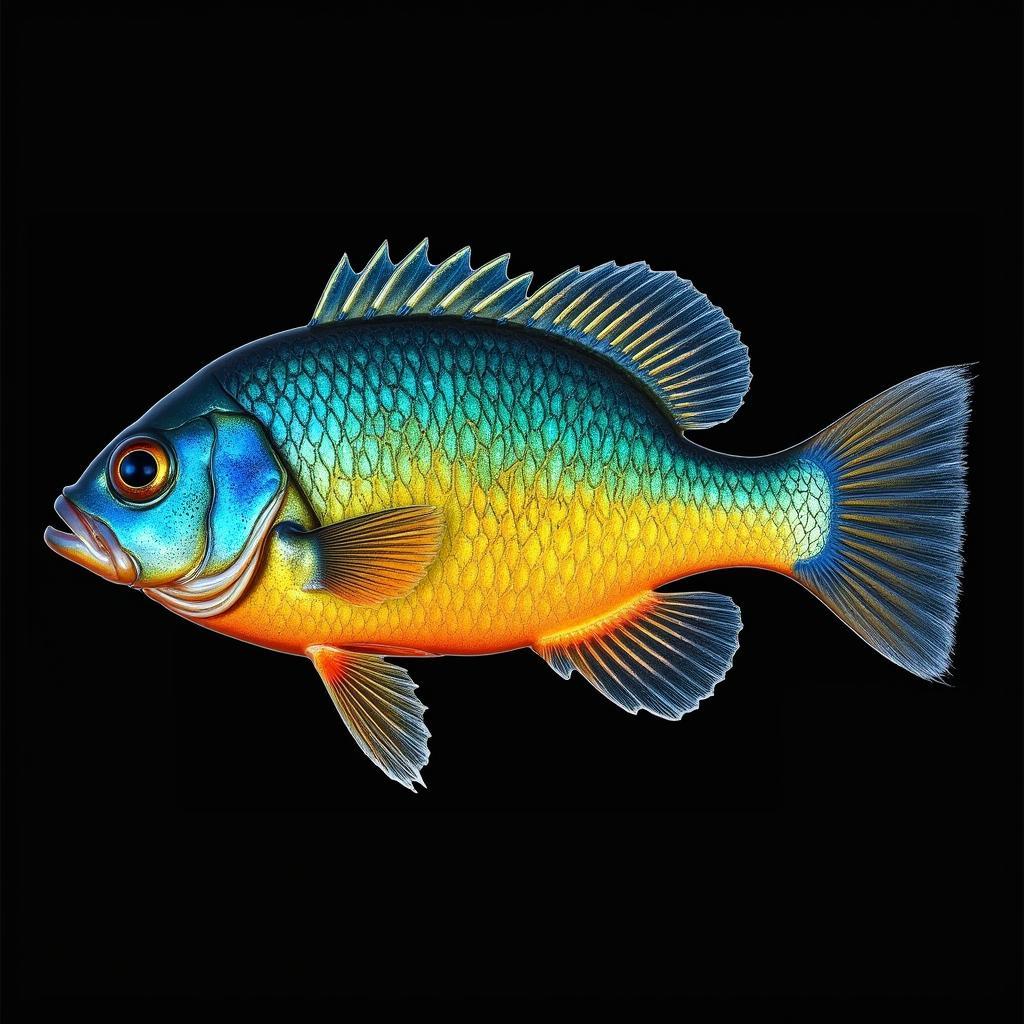Bluegill Fish Food is a crucial aspect of raising healthy and thriving bluegill. Whether you’re a seasoned pond owner or just starting out, understanding their dietary needs is essential for their growth and overall well-being. This guide dives deep into the world of bluegill nutrition, covering everything from their natural diet to the best commercial food options.
Understanding the Bluegill Diet
In their natural habitat, bluegills are opportunistic feeders, consuming a variety of aquatic insects, crustaceans, and zooplankton. Their diet shifts as they grow, with younger bluegill primarily feeding on zooplankton and gradually transitioning to larger prey like insects and small fish as they mature. This diverse diet is key to their nutritional balance. So, replicating this variety in a controlled environment is crucial. What do bluegill eat in a pond? A similar diet, but they may also consume algae and plant matter.
Choosing the Right Bluegill Fish Food
With a plethora of commercial fish foods available, selecting the right one for your bluegill can be overwhelming. Look for high-quality pellets or flakes specifically formulated for bluegill or sunfish. These specialized foods often contain a balanced blend of proteins, fats, carbohydrates, vitamins, and minerals essential for optimal growth and coloration.
What is the best food for bluegill? It depends on the age and size of your fish. Younger bluegill benefit from smaller pellets or flakes with higher protein content to support rapid growth. Larger, mature bluegill can handle larger pellets and require a slightly different nutritional balance. Consider fish food for bluegill to get tailored recommendations.
Feeding Frequency and Quantity
How often should you feed bluegill? Overfeeding can lead to water quality issues, while underfeeding can stunt growth. A good rule of thumb is to feed your bluegill as much as they can consume within a few minutes, two to three times a day. Observe their feeding behavior and adjust the quantity accordingly. During colder months, reduce the feeding frequency as their metabolism slows down.
Supplemental Feeding Options
Besides commercial food, consider supplementing your bluegill’s diet with live or frozen foods like bloodworms, daphnia, and brine shrimp. These treats provide variety and stimulate their natural feeding instincts. You can also cultivate natural food sources in your pond, such as insects and small crustaceans, by adding aquatic plants and creating a healthy ecosystem. Do you have bass and bluegill in the same pond? Check out fish food for bass and bluegill for options that cater to both species.
Enhancing Bluegill Coloration
Many commercial fish foods contain color-enhancing ingredients like carotenoids, which can intensify the vibrant hues of your bluegill. A diet rich in these pigments can make their colors truly pop, adding to the aesthetic appeal of your pond.
“A varied and balanced diet is essential for vibrant coloration in bluegill,” says renowned aquaculture specialist, Dr. Emily Carter. “Incorporating color-enhancing ingredients can significantly improve their appearance.”
 A close-up of a bluegill with vibrant, iridescent colors.
A close-up of a bluegill with vibrant, iridescent colors.
Bluegill Food Pellets: A Convenient Choice
bluegill food pellets offer a convenient and nutritionally complete option for feeding bluegill. They come in various sizes, making it easy to choose the right one for different growth stages. Floating pellets are especially beneficial as they allow you to observe your bluegill feeding and monitor their intake. Consider floating fish food for bluegill for easier monitoring and reduced waste.
“Floating pellets are an excellent choice for bluegill, as they prevent food from sinking to the bottom and decomposing, which helps maintain water quality,” adds Dr. Carter. “Plus, it’s fascinating to watch them feed!”
Conclusion
Providing the right bluegill fish food is essential for their health, growth, and vibrant coloration. By understanding their dietary needs and choosing high-quality food options, you can ensure your bluegill thrive in your pond. Remember to feed them appropriately and consider supplementing their diet with live or frozen foods for variety.
FAQ
- What is the ideal protein content for bluegill food?
- Can I feed my bluegill leftover human food?
- How do I store fish food properly?
- What are the signs of overfeeding?
- How can I encourage natural food sources in my pond?
- What are the benefits of floating fish food for bluegill?
- How can I tell if my bluegill are getting enough nutrients?
Need more assistance? Contact us at Phone Number: 02437655121, Email: minacones@gmail.com Or visit us at: 3PGH+8R9, ĐT70A, thôn Trung, Bắc Từ Liêm, Hà Nội, Việt Nam. We have a 24/7 customer service team.